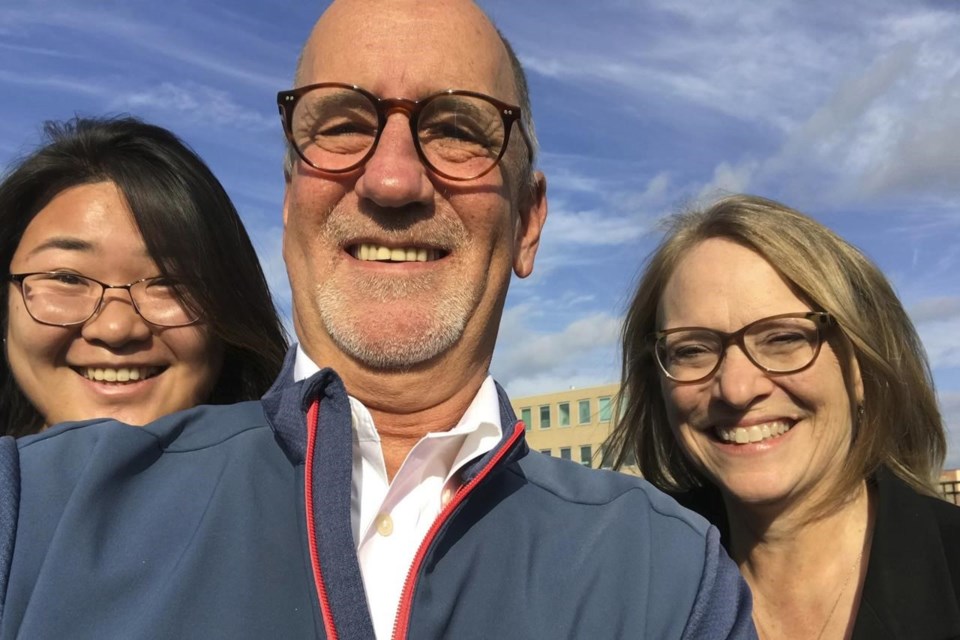Mark Gillispie, a veteran journalist who wrote about many of Ohio’s biggest stories and characters during a four-decade career primarily with The Associated Press and The Plain Dealer in Cleveland, has died. He was 63.
Gillispie, who was diagnosed with cancer last fall, died Sunday while in hospice care, his children, Sam Gillispie and Martha Hanna Gillispie, said Monday.
After joining the AP in 2014 as a reporter in its Cleveland bureau, he wrote about the police shooting of 12-year-old Tamir Rice, a breakaway Amish group that carried out beard-cutting attacks, and a statehouse bribery investigation involving Akron-based FirstEnergy Corp. He was sent to the scenes of several major breaking stories, including the 2018 massacre at a Pittsburgh synagogue. He was one of the AP's leading reporters on the opioid crisis and its legal aftermath for communities in Ohio and beyond.
Gillispie previously worked at The Plain Dealer for 24 years, writing investigative stories that included reporting on mortgage fraud and questionable overtime practices by Cleveland police. He also covered police, courts and local government, including the corruption case of former U.S. Rep. James Traficant.
He could put up a gruff exterior but just as easily show sensitivity to people dealt bad news. In the newsroom, he enjoyed offering guidance to young reporters.
“Journalism was Mark’s passion — poring over complicated documents, digging deep into stories, sharing sage advice to new reporters. But it was his family he was most passionate about,” said Christina Paciolla, AP's deputy director for text and former Ohio state news editor. “We’d often swap stories of our families, and bond over everything from baseball to living with grief. We will all miss Mark terribly as a colleague but more importantly, as a friend.”
At The Plain Dealer, he worked with his wife, Mary Lou Gillispie, a copy and design editor. He wrote lovingly about their marriage and about grieving her after she died of cancer in 2020 during the COVID-19 pandemic.
They were married in a Las Vegas chapel by a “man in a green leisure suit and a bad pompadour," he wrote.
“Mary Lou and I were the quintessential journalist couple. We met at a small paper outside Cleveland and snagged the big-city newspaper jobs we dreamed about,” he wrote.
The personal essay was a departure for someone who built a reputation as a tough but fair reporter who held public officials and institutions accountable.
“The pain endures, yet the darkness is slowly lifting,” Gillispie wrote two months after his wife's death. “I comfort myself with thoughts of how our final weeks in isolation were the most poignant of our 30 years together.
“The pandemic helped teach me the meaning of abiding love in all its guises. For that, I will be forever grateful.”
Gillispie grew up in Perry, Ohio, along Lake Erie. He was an avid cook, golfer, poker player and Cleveland sports fan, dreaming of the day when the city would celebrate a World Series championship.
He studied theater for a while at Wright State University, performed in community theater and enjoyed singing, though, he rarely shared his talent.
He surprised his daughter at her wedding last year, serenading her with “Sunrise, Sunset” from "Fiddler on the Roof.”
Gillispie served in the U.S. Army as a finance and accounting specialist, a time in his life that he said was transformative. He began his journalism career near his hometown at The News-Herald in Willoughby, where he was a reporter and editor. He met his wife there.
In addition to his two children, survivors include a brother and two sisters.
John Seewer, The Associated Press



